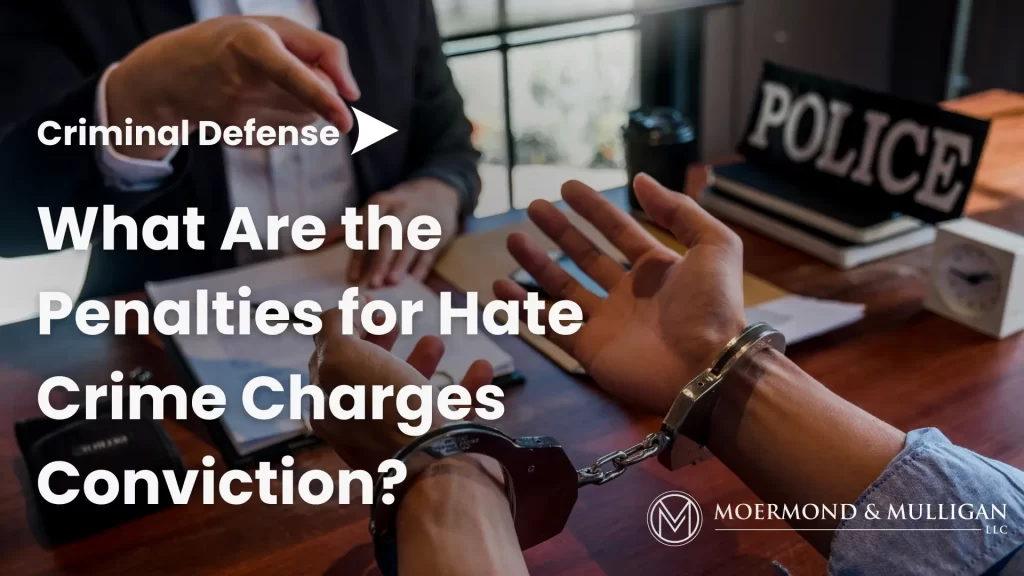Posted on Saturday, March 2nd, 2024 at 8:22 pm

Hate crimes are serious offenses that carry significant legal consequences. If you face hate crime charges, you need to understand the potential penalties and how they could impact your life. A conviction for a hate crime can result in lengthy prison sentences, substantial fines, and a permanent criminal record that follows you long after you’ve served your time.
The severity of the penalties depends on the nature of the underlying crime and whether you’re charged under Ohio or federal law. In Ohio, a hate crime conviction can elevate the charges by one degree, turning a misdemeanor into a felony or increasing the level of a felony offense. This means you could face years in prison and thousands of dollars in fines, even for a crime that might otherwise carry a relatively short sentence.
What is a Hate Crime?
A hate crime is a criminal act motivated by bias against a person’s race, religion, disability, sexual orientation, ethnicity, gender, or gender identity. These crimes can include physical assault, threats, property damage, or other offenses. The key element that distinguishes a hate crime from other crimes is the perpetrator’s intent to target a victim based on their membership in a protected group.
Hate crimes are particularly harmful because they not only affect the individual victim but also create fear and intimidation within the targeted community. They can increase tensions and mistrust between different groups, ultimately undermining social cohesion and a sense of safety in society.
Intent Matters in Hate Crimes
To prove a hate crime, prosecutors must show that prejudice fueled the defendant’s actions. This means that even if the victim belongs to a protected group, the crime might not qualify as a hate crime if the perpetrator was not motivated by bias. However, if the evidence demonstrates that the defendant targeted the victim because of their race, religion, or another protected characteristic, the charges could be elevated to a hate crime.
Proving intent can be challenging, requiring a thorough investigation into the defendant’s background, statements, and actions. Prosecutors may look for evidence to establish that the crime is motivated by hatred of perceived race, color, and religion. This evidence can include owned hate symbols, the use of biased language, or a history of prejudiced behavior.
Ohio Hate Crime Laws
Ohio law defines hate crimes as “ethnic intimidation.” If you commit a crime like menacing, assault, or vandalism and target the victim based on their race, color, religion, or national origin, you could face ethnic intimidation charges in addition to the underlying offense. Ethnic intimidation is generally classified one degree higher than the base crime, meaning a first-degree misdemeanor becomes a fifth-degree felony, and so on. This can add significant prison time and fines to your sentence.
Federal Hate Crime Legislation
 Federal hate crime laws also provide serious penalties for those convicted. The Matthew Shepard and James Byrd Jr. Hate Crimes Prevention Act allows federal prosecutors to pursue hate crimes based on a victim’s race, color, religion, national origin, gender, sexual orientation, gender identity, or disability. Violating this law can result in up to 10 years in federal prison and even life imprisonment if the crime involves kidnapping, sexual abuse, or murder.
Federal hate crime laws also provide serious penalties for those convicted. The Matthew Shepard and James Byrd Jr. Hate Crimes Prevention Act allows federal prosecutors to pursue hate crimes based on a victim’s race, color, religion, national origin, gender, sexual orientation, gender identity, or disability. Violating this law can result in up to 10 years in federal prison and even life imprisonment if the crime involves kidnapping, sexual abuse, or murder.
Federal hate crime charges can apply when the offense occurs on federal property or if the defendant crosses state lines to commit the crime. They can also apply if the crime interferes with the victim’s participation in certain federally protected activities, such as attending school, working, or voting.
Other Federal Hate Crime Laws
In addition to the Hate Crimes Prevention Act, other federal laws address specific types of bias-motivated crimes. For example, the Church Arson Prevention Act makes it a felony to damage religious property. This is because of its religious character or to obstruct a person’s free exercise of religious beliefs. Violations can lead to up to 20 years in prison. Similarly, the Fair Housing Act prohibits housing discrimination based on race, religion, sex, or national origin. Those who use force or threats to interfere with these rights can face fines and up to 10 years in prison.
These additional federal laws demonstrate the government’s commitment to prosecuting hate crimes and protecting vulnerable groups from discrimination and violence. They also give prosecutors more tools to hold offenders accountable and seek justice for victims.
The penalties for hate crime convictions are severe. A conviction can have far-reaching consequences for your freedom, your future, and your reputation.
Offenses Covered Under the Ethnic Intimidation Law
Although the earlier examples are concerned with threats of harm against another, those are not the only types of offenses that can be enhanced under the ethnic intimidation statute.
A person may face increased penalties if they committed any of the following offenses and their actions were based on race, color, religion, or national origin:
- Criminal damaging or endangering
- Criminal mischief
- Telecommunications harassment
Increased Penalties for Hate Crimes
If a person is found guilty of a biased-related offense, they may face penalties for the next higher degree for the underlying crime. For instance, suppose a woman gets out of her car and encounters another individual. For whatever reason, she threatens to harm that person should they get closer to her. Because of her actions, she could be charged with menacing, which occurs when someone makes another person believe that they will physically harm them or their property.
In Ohio, menacing is a fourth-degree misdemeanor. The conviction penalties for this offense include up to 30 days in jail and/or a fine of up to $250.
Now, let’s return to the example of the woman getting out of her car. Say she perceives the person she passes as a member of a certain race. Along with her threat of harm, she also uses a racial slur. In this case, she can be charged with ethnic intimidation and menacing. Instead of the offense being a fourth-degree misdemeanor, it is now a third-degree misdemeanor. Because her crime is considered a hate crime, the woman faces up to 60 days in jail and/or a fine of up to $500.
Although the example discusses a crime increasing from one degree of misdemeanor to the next higher one, the ethnic intimidation law does not allow only for enhancements within the same level of offense, which means that a misdemeanor can be increased to a felony. For instance, say the woman in the earlier example threatens to hit the other person with her car. Because she has threatened to cause serious physical harm, the offense becomes aggravated menacing, which is a first-degree misdemeanor. If that threat is coupled with words demonstrating that her actions were motivated by racial bias, the crime becomes a fifth-degree felony.
Contact a Criminal Defense Lawyer
If you face hate crime charges, you need a skilled criminal defense attorney who understands both Ohio and federal laws. They should also be able to build a strong defense strategy on your behalf. Seek legal representation – the sooner you have an experienced lawyer on your side, achieving a favorable outcome is easier.
At Moermond & Mulligan, LLC, our attorneys have extensive experience defending clients against hate crime charges at both the state and federal levels. We know what it takes to protect your rights and fight for the best possible result in your case. If you or a loved one faces accusations of a hate crime, contact Moermond & Mulligan, LLC today for a confidential consultation. Let our Cincinnati criminal defense lawyers apply our knowledge and commitment to assist you.
Related Posts:
Written By: Moermond & Mulligan, LLC
Last Updated: 02-11-2025